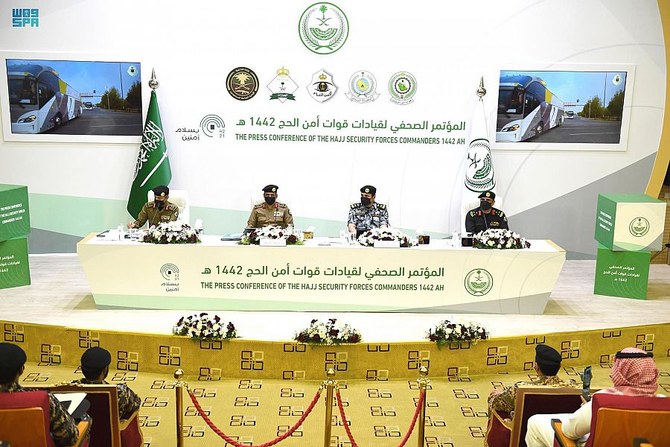MAKKAH: A tight security cordon is in place around Makkah and its holy sites to prevent unauthorized people entering the city during Hajj, commanders of the operation said on Wednesday.
They also stressed that pilgrims will not be permitted to travel on foot from the Grand Mosque to Arafat, or between Arafat, Muzdalifah and Mina.
During a briefing at the Unified Security Operations Center (911) in Makkah, Commander of Hajj Security Forces Maj. Gen. Zayed bin Abdulrahman Al-Tuwayan, said people will only be able to move between the sites on buses provided for the purpose.
“These buses are in four colors,” he said. “Each color refers to certain areas within the holy sites. Pilgrims are expected to abide by the instructions in this regard, as they will not be allowed to move on foot.”
All entrances to Makkah are monitored not only by security officers, Al-Tuwayan said, but also by thermal-imaging cameras to prevent people without Hajj permits accessing the holy sites.
“The mountains surrounding Makkah and all its valleys, where people with no Hajj permits might believe they can access the holy sites, are completely monitored by the Mujahideen force and equipped with cameras to foil such attempts,” he added.
He urged all citizens and residents to cooperate with the security forces during this exceptional time of challenges caused by the pandemic, for the well-being of all.
However he pointed out that the force’s planning for Hajj does not only focus on security, health and organizational measures, but also on providing help and assistance when needed.
“Pilgrims’ safety is a top priority but our services also include directing pilgrims who get lost to their destinations, and keeping safe any items they might lose while carrying out their rituals,” said Al-Tuwayan.
Maj. Gen. Mohammed Al-Bassami, assistant commander of Hajj Security Forces for the security of the Grand Mosque and its surroundings, confirmed that the mosque is now ready to welcome pilgrims.
“With coordination with the Hajj and Umrah Ministry, pilgrims can get to the Grand Mosque, beginning from 6.00 a.m. on the 7th day of Dhul Hijja (July 17),” he said. “With the health preventive measures agreed upon with the concerned authorities, the Mataf can accommodate from 4,000 to 6,000 pilgrims per hour.”
He added that his forces will facilitate and manage entry into the mosque.
The security forces are working closely with health authorities to protect pilgrims and prevent the spread of the coronavirus during Hajj, and Al-Bassami told Arab News that he is very proud of the steps Saudi Arabia is taking to achieve this.
“We have a very high level of coordination with the Ministry of Health, which is always present with us in all our steps and procedures,” he said. “In fact, the whole Hajj plan was built on security, health and organizational bases. There is no doubt the Health Ministry is an essential partner in the overall plan.”
Maj. Gen. Salman Al-Jumai’e, assistant commander of Hajj Security Forces for traffic, said that 2,500 buses have been provided to transport pilgrims wherever the need to go, from the moment they arrive for Hajj until they leave.
“These buses are scheduled to make 26,000 trips inside Makkah, Arafat, Muzdalifah and Mina,” he said. “As part of our duties, we will be monitoring the traffic flow, attending to traffic accidents and managing the checkpoints and shuttle buses.”
Brig. Gen. Ali Al-Qahtani, assistant commander of Hajj Security Forces for security patrols, added that his forces, which include foot patrols, officers on motorbikes and undercover patrols, will serve and help pilgrims and prevent unauthorized vehicles gaining access to the area.
As a result of the COVID-19 pandemic, this year’s Hajj is restricted to 60,000 pilgrims from within the Kingdom.
Meanwhile, spokesman for the Hajj Security Forces Command, Brig. Gen. Sami Al-Shuwairekh, said that 10 people have been arrested for violating the Hajj regulations and instructions, as they did not have a valid permit.
He said legal measures have been taken against them and they have each been fined SR10,000 ($2,666).
Al-Shuwairekh called on all citizens and residents to abide by the instructions for this year’s pilgrimage season, adding that security forces will take legal measures against anyone who tries to reach the Grand Mosque, its central surrounding area and the holy sites (Mina, Muzdalifah, and Arafat) without a permit until July 23.

























